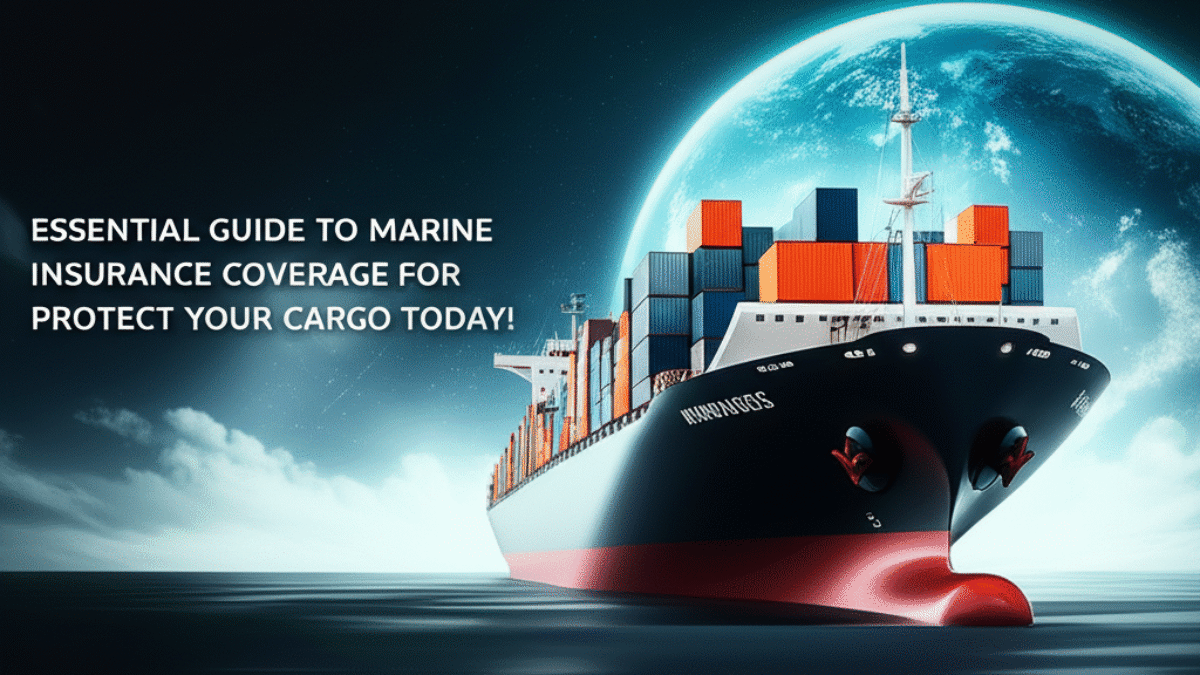When it comes to international shipping, the vastness of the ocean can be both a blessing and a curse. With goods traveling thousands of miles across unpredictable waters, the risks involved in transporting cargo are significant. As someone who has navigated the complexities of marine insurance, I can tell you this: protecting your cargo isn’t just advisable; it’s essential. In this essential guide to marine insurance coverage, we’ll explore how this type of insurance works, what it covers, and why it’s crucial for anyone involved in international shipping.
Imagine you’re a business owner who has just shipped a container full of valuable merchandise across the globe. The excitement of closing a deal is palpable, but suddenly, a storm hits, and your shipment is lost at sea. What do you do? How can you recover your losses? This is where marine insurance comes into play. In this article, I’ll break down the fundamentals of marine insurance, guide you through its key components, highlight its significance, and provide practical applications to safeguard your investments. By the end, you’ll have a clear understanding of how to protect your cargo effectively and ensure peace of mind in your shipping endeavors.
Understanding Marine Insurance
Marine insurance is a specialized form of insurance designed to cover the loss or damage of ships, cargo, terminals, and any transport or cargo by which property is transferred, acquired, or held between points of origin and final destination. Essentially, it acts as a safety net that mitigates the financial risks associated with shipping goods over water.
Unlike standard insurance policies that cover a wide range of risks, marine insurance is tailored to the unique challenges of maritime transportation. It protects against various perils, including rough weather, piracy, and accidents, ensuring that your business doesn’t suffer catastrophic losses due to unforeseen circumstances.
Marine insurance isn’t just for large corporations; small businesses and individual traders can benefit from it as well. Understanding the nuances of marine insurance can empower you to make informed decisions and secure your assets effectively.
Key Components of Marine Insurance
To navigate the world of marine insurance, it’s essential to understand its key components. Below are the primary elements that you should be aware of:
Types of Marine Insurance Policies
There are several types of marine insurance policies, each catering to specific needs:
- Hull Insurance: This covers physical damage to the ship itself, including accidents and weather-related incidents. If your vessel sustains damage, this policy can help cover repair costs.
- Cargo Insurance: This covers loss or damage to the cargo being transported. Whether the goods are lost at sea or damaged during transit, this type of insurance ensures that you can recover your financial losses.
- Protection and Indemnity (P&I) Insurance: This is a liability insurance for shipowners, covering legal costs and claims for damages caused to third parties, including environmental damage or injury to crew members.
- Freight Insurance: This protects the freight forwarder’s liability for loss or damage to cargo while in transit.
Key Terms in Marine Insurance
Familiarizing yourself with essential terms will help you navigate marine insurance more effectively:
- Insurable Interest: You must have a financial stake in the cargo or vessel to obtain insurance. If you stand to lose money, you can insure it.
- Underwriting: This is the process insurers use to assess risk and determine premium rates based on the likelihood of a claim.
- Premium: This is the amount you pay for the insurance coverage. It varies based on the value of the cargo, the type of insurance, and the level of risk involved.
Benefits and Importance of Marine Insurance
Now that we understand the components of marine insurance, let’s talk about why it’s crucial for anyone involved in international shipping.
Financial Protection
The most significant benefit of marine insurance is the financial protection it offers. Shipping goods internationally involves considerable investment. If anything goes wrong, the losses can be devastating. Marine insurance provides a safety net that ensures you can recover your investment, allowing you to continue your business operations without crippling financial strain.
Risk Management
Every business faces risks, but effectively managing those risks is vital for success. By investing in marine insurance, you can mitigate the impact of adverse events like theft, damage, or loss of cargo. This proactive approach not only safeguards your assets but also enhances your overall business strategy.
Peace of Mind
As a business owner, worrying about potential losses can be stressful. Marine insurance offers peace of mind, knowing that your cargo is protected. You can focus on growing your business rather than constantly fretting about the uncertainties of shipping.
Compliance with Legal Requirements
In many cases, having marine insurance is a legal requirement, especially when dealing with international shipping. Certain countries or shipping companies may mandate specific types of insurance to ensure that cargo is adequately protected. By securing the necessary coverage, you can avoid legal complications and maintain a smooth shipping process.
Practical Applications of Marine Insurance
Now that we’ve discussed the benefits, let’s explore some practical applications of marine insurance in real-world scenarios.
Case Study: A Small Business Owner’s Experience
Consider Jane, a small business owner who imports handmade crafts from artisans in Southeast Asia. After a successful trade fair, she decided to place a large order, shipping her products across the ocean. Jane knew that the total value of her shipment was significant, and she wanted to protect her investment. With marine cargo insurance, she ensured that if anything happened during transit, she could recover her losses.
When a storm hit midway through the journey, Jane anxiously awaited news of her shipment. Thankfully, her insurance covered the damages incurred, allowing her to receive compensation and reorder inventory without suffering financial hardship. Jane’s experience highlights the importance of marine insurance for small business owners relying on international shipping.
Real-World Examples of Marine Insurance Claims
Marine insurance claims can arise from various incidents. Here are a few examples that illustrate its necessity:
- Container Ship Fire: In a notorious incident, a container ship caught fire, resulting in significant losses for the cargo owners. Those with marine cargo insurance could recover their losses, while others faced devastating financial consequences.
- Piracy Threats: The rise of piracy in certain regions has made marine insurance vital. Companies shipping goods through high-risk areas can secure coverage that protects against theft and ransom demands.
- Natural Disasters: Hurricanes and typhoons can wreak havoc on shipping routes. Insurance can cover losses related to delays, damage, or destruction caused by such events.
Frequently Asked Questions
What is marine insurance?
Marine insurance is a type of insurance that protects against the loss or damage of ships, cargo, and other transport related to maritime activities. It covers various risks associated with shipping goods over water, providing financial protection to businesses engaged in international trade.
How does marine insurance work?
Marine insurance works by providing coverage for specific risks associated with maritime transportation. When you purchase a policy, you pay a premium based on the value of the cargo and the perceived risk. If an insured event occurs, such as damage or loss, you can file a claim to recover your financial losses based on the terms of the policy.
What does marine cargo insurance cover?
Marine cargo insurance typically covers loss or damage to goods while they are in transit over water. This includes coverage for theft, damage due to weather events, accidents, and certain types of liability. However, exclusions may apply, so it’s essential to review the policy carefully to understand what is and isn’t covered.
Is marine insurance mandatory?
While marine insurance is not universally mandatory, it is often required by shipping companies, ports, or certain countries to ensure that goods are adequately protected during transit. Additionally, lenders may require insurance if you are financing the shipment, making it a prudent choice for businesses involved in international trade.
How can I choose the right marine insurance policy?
Choosing the right marine insurance policy involves assessing your shipping needs, understanding the risks involved, and comparing different policies. Consider factors like the value of your cargo, the shipping routes, and your budget. Consulting with an insurance broker experienced in marine insurance can also provide valuable insights and help you make an informed decision.
What should I do if I need to file a marine insurance claim?
If you need to file a marine insurance claim, start by documenting the loss or damage thoroughly. Take photographs, gather shipping documents, and report the incident to your insurance provider as soon as possible. Follow the claims process outlined in your policy and provide all necessary information to support your claim. Be prepared for an investigation, as insurers will assess the validity of your claim before issuing compensation.
Conclusion
In conclusion, marine insurance is a vital tool for anyone involved in international shipping. It offers financial protection, risk management, and peace of mind, ensuring that your business can thrive despite the challenges of maritime transportation. By understanding the key components of marine insurance and its practical applications, you can make informed decisions that safeguard your investments.
As you embark on your shipping journeys, remember the importance of protecting your cargo. Whether you’re a seasoned professional or a newcomer to international trade, securing the right marine insurance policy is a crucial step in your success. Don’t leave your assets unprotected—take action today to safeguard your business and ensure smooth sailing ahead!


